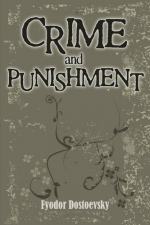|
|
Crime and Punishment Author/Context
Fyodor Dostoevsky was born in Moscow on October 30, 1821, a second son of a physician, Mikhail and an intelligent, engaging mother, Marya. Fyodor and his older brother of one year, Mikhail Mikhaylovich, were both talented writers and remained close throughout their lives. Five younger siblings populated Dostoevsky's life, three sisters and two brothers.
Dostoevsky grew up in a Christian home, where his parents fostered an atmosphere centered around faith and education. As a child, Dostoevsky read regularly from the bible. His parents would read to their children from Nikolay Karamzin's History of the Russian State. Other early literary influences were the gothic novels of Ann Radcliffe, the idealistic writings of Schiller, as well as works by Sir Walter Scott, the great Russian poet Pushkin, and Nikolay Gogol.
In 1837, Dostoevsky experienced the painful death of his beloved mother. Dostoevsky and his older brother were sent to study at a boarding school in St. Petersburg. A year later, Dostoevsky entered the Academy of Military Engineers. St. Petersburg would have a great impact on Dostoevsky's artistic and spiritual development. As a city of both European and Slavic sensibilities, St. Petersburg opened up the literary side of his soul.
In 1844, Dostoevsky ended his military career to focus full time on writing. His first major work, Poor Folk, was hailed by the influential literary critic, Belinsky, as a work of genius. But when it was published in 1846, it received mixed reviews. Known to be hyper-sensitive, Dostoevsky spent the next years of his life defining and redefining his artistic talents. In 1849, due to his political radicalism, Dostoevsky was arrested, imprisoned in Siberia, and ordered to face the firing squad. At the last minute, however, Nicholas I, the Tsar, overturned the death sentence. In 1857, Dostoevsky married the widow Marya Dmitrievna. Seven years later, Dostoevsky experienced the deaths of his wife and older brother. In the following years, Dostoevsky went through a period of poverty, excessive gambling, and failed loves. In 1866, Crime and Punishment and The Gambler were published, solidifying Dostoevsky's status as one of Russia's preeminent writers. A year later, he married nineteen year old Anna Grigorievna Snitkina, who provided him with the stability he was searching for. Dostoevsky traveled to Europe for several years before coming back to Russia with a sense that his country was at a crossroads.
Dostoevsky became increasingly disillusioned with the Russian radical intelligentsia, especially the Nihilists and their contempt of traditional values. In 1872, Dostoevsky agreed to the editorship of the conservative weekly journal, "The Citizen." He wrote an influential column called "Diary of a Writer," which became an independent publication of its own. The "Diaries" exerted enormous influence and Dostoevsky was reputed to be the voice of the national conscience.
In 1874, Dostoevsky began work on his final novel, The Brothers Karamazov, his literary masterpiece of parricide that reflected and prophesized the death of the Tsar and in turn, traditional Russian society. It was Dostoevsky's last effort to curb the tide of Russian radicalism with a message of Christian brotherhood and reconciliation. Dostoevsky died in 1881. Thousands marched behind his funeral procession, a measure of his extraordinary impact on Russia's very heart, soul, and mind.
Today, Dostoevsky is widely considered to be one of the greatest novelists of the modern age and perhaps of all time, ranking right up there with Dante and Shakespeare. Leo Tolstoy writes, "...Everything that he did was of the kind that the more he did of it the better I felt it was for men..."
Bibliography
Amoia, Alba. Feodor Dostoevsky. New York: Continuum Publishing Company, 1993.
Coulson, Jessie. Dostoevsky: A Self Portrait. London: Oxford University Press, 1962.
Dostoevsky, Feodor. Crime and Punishment. Ed. George Gibian. New York: W.W. Norton & Company, 1964.
Dostoevsky, Fyodor. Crime and Punishment. Trans. Constance Garnett. Toronto: Bantam Books, 1982.
Frank, Joseph. Dostoevsky: The Miraculous Years. Princeton: Princeton University Press, 1995.




